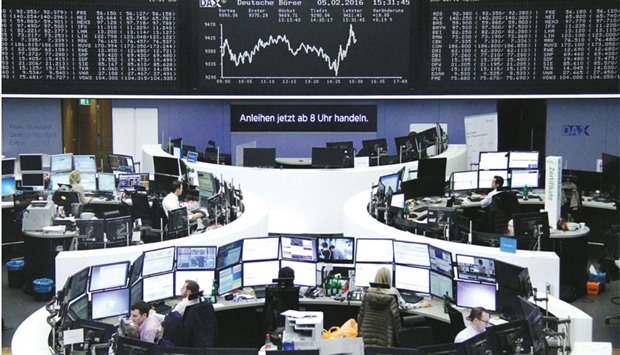European stocks gave up early gains and Wall Street also fell yesterday after a US jobs report sent conflicting signals about the economy, reviving jitters about global growth.
Shares in London, Frankfurt and Paris all dipped after rising earlier in the session following data that showed US hiring slowed last month but that the jobless rate has fallen to an eight-year low.
Germany’s DAX led Europe’s main bourses into negative territory, closing 1.14% down at 9,286.23 points; followed by the FTSE in London, down 0.86% at 5,848.06 points; and France’s CAC down 0.66% at 4,200.67 points. The Euro STOXX 50 closed down 1.22% at 2, 869.92 points.
Wall Street stocks also dropped as highly anticipated American jobs data painted a far from clear picture over the likelihood of another interest rate hike by the US Federal Reserve.
After a tumultuous start to the year fuelled by a slowdown from Asia to South America, the focus has turned to the US, the world’s biggest economy and key driver of world growth.
“Domestic stocks are moving lower with the Street grappling with further Fed rate hike uncertainty following the January labour report, which showed smaller-than-expected job growth and stronger-than-expected wages,” Charles Schwab analysts said in a note.
The US has enjoyed reasonable results for the past few years in the face of a worldwide malaise, but a string of weak data out of Washington recently has led to speculation it is now in the firing line.
On Thursday, figures showed orders for manufactured goods fell again in December and jobless claims rose last week. That came after data pointed to a slowdown in factory activity, easing economic growth, a drop in consumer spending and weakness in the crucial services sector.
Yesterday’s jobs data showed a downshift pace of hiring in January offering fresh evidence of the US economy hitting a soft patch.
However, unemployment fell to 4.9% and wages rose, which if sustained, would support another rate hike.
Ahead of the figures, growing fears that global economic turmoil was seeping into the US kept pressure on the dollar hitting Japanese stocks.
The dollar has taken a hit this week, sinking well below ¥117, from above ¥121 at the end of last week when the Bank of Japan said it would adopt a negative interest rate policy.
The euro has also rallied against the US unit, while the weakened greenback has provided some support to oil prices as it makes the commodity cheaper for buyers not using dollars to make transactions.

Traders work at the stock exchange in Frankfurt. The DAX closed 1.14% down at 9,286.23 points yesterday.
